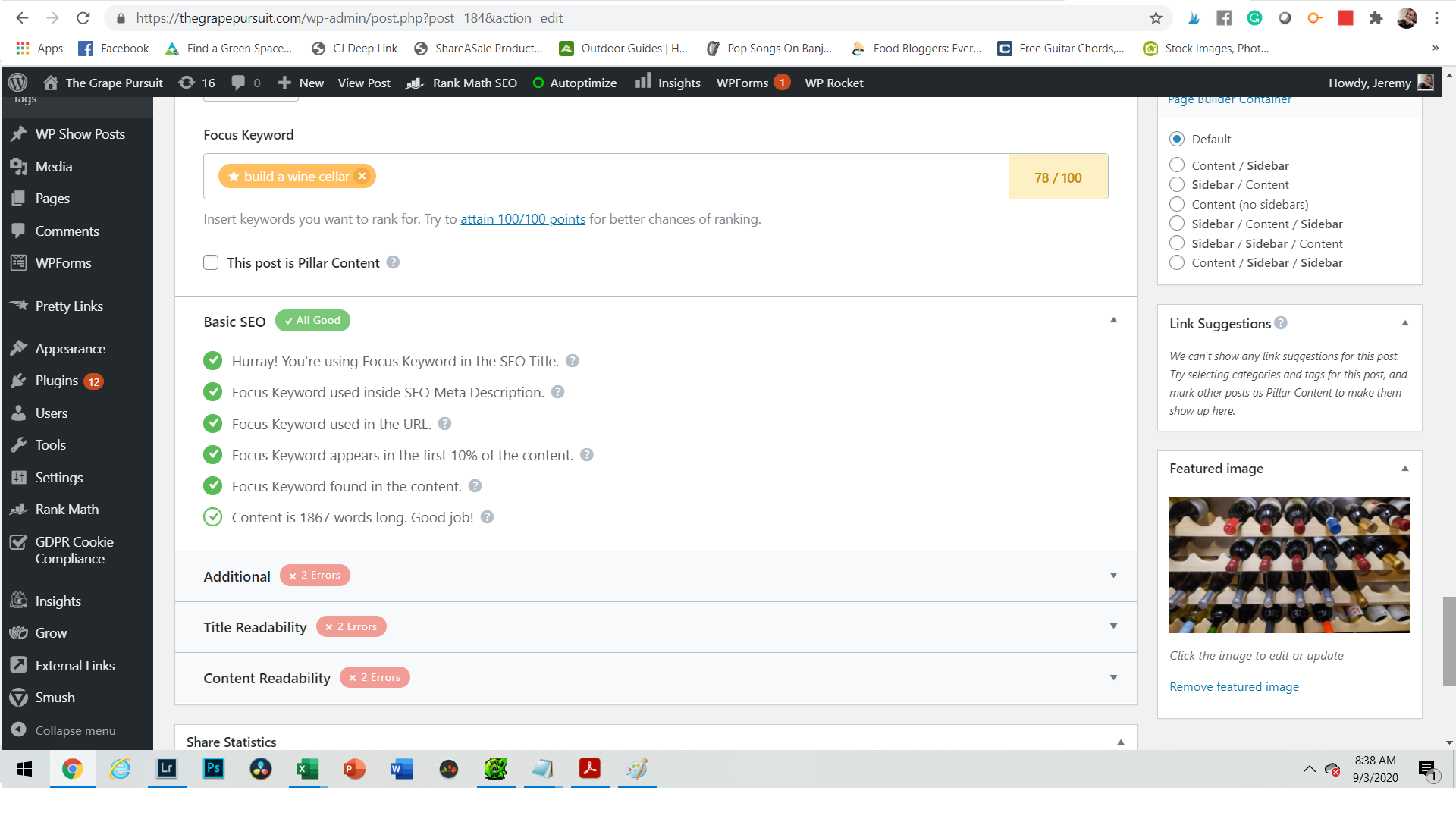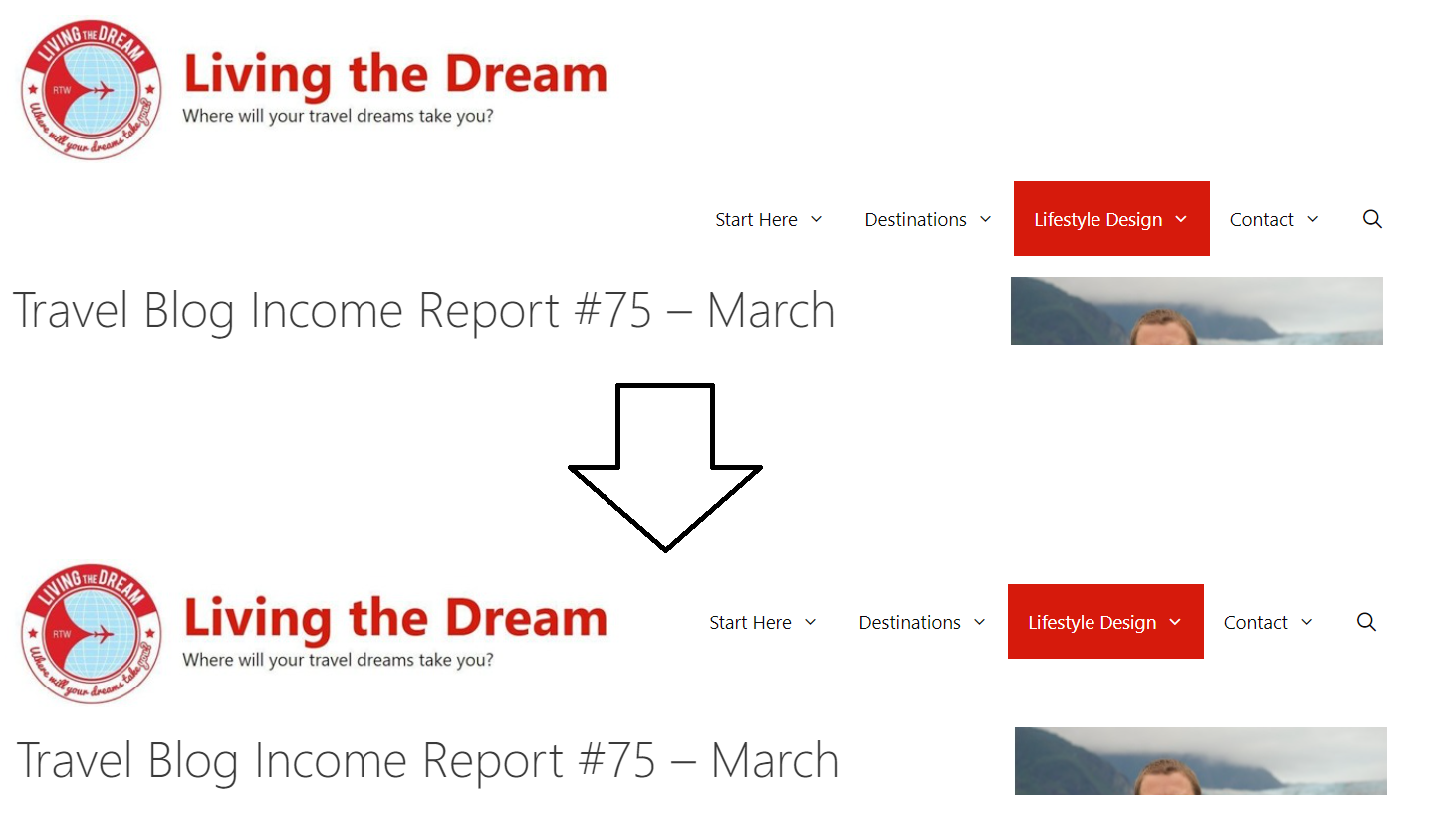Published by Jeremy. Last Updated on April 1, 2024.
Disclaimer: This Week in Blogging uses demographic data, email opt-ins, and affiliate links to operate this site. Please review our Terms and Conditions and Privacy Policy.
Another month, another Google Core Algorithm update was rolled out, and the March 2024 update sure was a doozy.
We're not going to sugar coat it- this one was bad. In fact, it was probably the worst update we've seen for bloggers in our 15+ years of working in the industry.
Still, as the algorithm update is on-going, no one has a clear understanding of what is going on. But that doesn't mean the theories aren't flying. So in this one, we thought we'd share some popular conspiracy theories we've seen about the March 2024 core algorithm update, and breakdown why we think most are just that- conspiracies.
Theory: Google is Prioritizing “Big” Sites
In this theory, Google is thought to be rewarding “big” sites either via backlink profiles or through related partnerships (a la Reddit). By extension, big sites get a big rankings boost, and smaller sites, where most blogs fall into, get downgraded despite having arguably better E-E-A-T metrics.
Our take? Absolutely.
Let's be honest here- every Google update seemingly rewards big sites at the start. Backlinks make the world go round, and no amount of handwaving or fancy marketing will change our opinion of this.
It isn't until the supposed RankBrain algorithm starts to take over that we see SERPs change after an update. This one is thought to analyze performance data and re-shuffle results accordingly over time. It doesn't make sense if a site ranking 3rd gets more clicks than a site ranking 2nd, so this algorithm is believed to adjust for real-world user data- overriding other more obvious metrics, like backlinks, in the process.
While we're not sure if RankBrain is still being used (we would hope- it is a smart way to do things), the fact that the March core algorithm update includes many ongoing sub-updates within it could certainly explain the volatility being seen right now. Every time there has been some rumored volatility, big sites get shuffled back to the top at the expense of smaller ones. Over time, we sneak back up in SERPs (likely due to RankBrain), only to be knocked back down again the next time volatility gets reported a few days later.
As the dust settles, we will not be surprised if “smaller” sites start creeping back up in SERPs based on real-time performance data. Google just needs to cool it with the updates for a bit for this to happen, though.
- Note: Backend partnerships are thought to be artificially changing rankings also (like Google's deal with Reddit). If Reddit is permanently listed as a de facto snippet around position four, anything below that is going to be pushed down accordingly, independent of algorithms.
Theory: Over-Optimization of SEO is Now Bad
In this theory, Google is thought to be punishing sites that have overly optimized around what was previously considered to be SEO best practices. The theory goes on that they are getting better at recognizing when a site is designed to game the system and, therefore, are punishing those who push things too hard.
Our take? Maybe.
The hard truth is that all SEO is an attempt to game search engines. The entire premise of SEO is doing what we can to try and rank higher in Google, and for years Google has been saying a rather passive-aggressive “please don't” in response.
We're pretty confident that in a perfect world (in Google's view), all attempts at SEO would be ignored. They would have the best algorithm that could detect great content, and everything would be controlled on their end without us being able to do anything about it. But, alas, that perfect world doesn't exist, SEO is a thing, and here we are. (But also, if Google was just honest with how to improve rankings, this mess probably wouldn't exist, either.)
It has always been our view that over-optimization is bad. Things like keyword stuffing, black hat link building, and others come to mind. These are all known issues that Google has targeted with manual or algorithmic penalties.
But is the current update punishing overly optimized sites? It is possible, but so far, we haven't seen a single theory that attempts to explain what over-optimization could mean in relation to this update.
Suffice it to say, we've always felt that the recommendations in SEO plugins are almost always too aggressive and trend to over-optimization territory. I don't go for that 100 score in Rank Math, I like my posts at 80-90. Don't go out of your way to incorporate every SEO idea- write naturally as best as possible. If it feels like you're pushing too hard, you likely are. If you recognize it, a robot most certainly should be able to, too.
So while some sites are most certainly over optimized, for this theory the most we can say right now is a resounding maybe- it is simply too vague right now.
Theory: Google is Flexing to Weed Out Sites
In this theory, Google is thought to be flexing its muscles on “low quality” sites to force many businesses out of the space completely. How do you deal with millions of sites trying to game the system in one swoop? Put the pressure up for a while and see who folds.
Our take? Probably not.
We will be the first to admit that Google has a very serious problem with low-quality sites trying to game the algorithms, and for every one good site that exists, there is likely an untold number of “bad” sites out there that are ruining things for the rest of us.
One element of this theory suggests that the first sites to fold in a pressure situation like this one are low-quality sites benefiting from key SEO exploits. So by pushing everyone except the biggest players down for a period of time, many of these would self-identify and, hopefully, close up shop. Then what would remain would be from those who really do care about what they're putting out there.
Would you keep up a flimsy business if Google killed your model overnight? Probably not. Would you keep up with things if you are passionate about it and love what you do either way? There is a reason why we often ask would-be bloggers “would you continue blogging if you weren't making money?” and this situation certainly illustrates the point nicely.
Although I would like to see Google put the pressure on these poor sites only, the main problem with this theory is that it implies a future update would change things back once sites self-purge out of the system. This, of course, is never guaranteed as the update could simply be a new normal as opposed to anything temporary. Still, we're going to continue to prove our worth to search engines independent of what is going on because we truly believe in our content.
Theory: Affiliate Sites Are Being Punished
In this theory, Google is thought to be punishing sites that have overly aggressive affiliate plays. Part of this has been theorized because there are simply a lot of junk affiliate sites out there (which is true- many fit in the above theory), and the other part is that affiliate sites are directly competing with native Google products, like travel booking tools found at the top of travel-related searches.
Our take? Maybe.
This one feels a bit like a yes and no because the nature of affiliate sites is indeed two-fold. Should overt affiliate sites that have no experience on a topic rank? If we're talking about sites that only use stock photos, compare products based on what is included in public specifications, and offer no first-hand experiences through actual use, we would agree- they shouldn't be listed. This is the literal definition of unhelpful content.
But for the average blogger who is simply putting a link to a product they personally use and recommend or are selling travel products on their travel site, the vast majority of the time, the answer should be no.
We go maybe here because it does seem like there have been some impacts in the affiliate world, but whether it is a coincidence remains to be seen. Are sites being hit because they are not following E-E-A-T principles or because all the affiliate links are not labeled nofollow/sponsored? Is having too many affiliate product scripts on your site something that got you dinged? Again, maybe, but it is too hard to say for now.
Considering Google can already give itself the first spot for any affiliate product it creates, actively downgrading third-party content simply because it has an affiliate link feels like a recipe for yet another antitrust lawsuit, too. As such, it really does feel unlikely that affiliates are a major issue here.
Should you do anything if you got hit and think its affiliate related? That would depend on how you recommend products. If you're doing everything ethically, disclosed, and appropriately tagged (read: nofollow and/or sponsored), I'd argue no. But I'd also be remiss if I didn't say that I also took off some underperforming site-wide affiliate prompts all the same.
I don't want to risk losing my rankings over $50/month for some product tests, even if it only turns out to be paranoia. But, that said, I'm also not changing the setups that bring in $1,000/month, either.
Theory: Advertising is Being Punished
In this theory, Google is thought to punish sites that have overly aggressive advertising plays in favor of sites that do not. This came about because some “experts” found that sites that got hit had ads, so therefore theorized that ads could be part of the problem (even if ad networks have said otherwise).
Our take? Probably not.
At the end of the day, the single biggest beneficiary of digital advertising is, to no one's surprise, Google. The vast majority of digital ads that are displayed on websites run through a Google-related product in some capacity.
Of course, they do not run 100% of internet advertising, but Google's advertising revenue was estimated to be north of $230 billion in 2023. So, why would they mess with that? Every dollar lost to publishers is also likely lost money to Google, so why would they purposefully punish a site that is following their own established best practices if it will affect their bottom line?
The only scenario where this could be the case is if the search algorithm department simply doesn't talk to the advertising department, as we fully expect some of these changes to really hit Google's bottom line. Could we be wrong? Of course. But we also know how the left hand ignores the right hand at big companies, so if it comes out to be ad-related, we have to admit we would not be surprised even if we think it is unlikely. We just may have to wait for the next quarterly revenue report for more clarity here.
Theory: Google is Testing SGE Results in SERPS
In this theory, Google is thought to be changing SERPs to mimic what the SGE results may inevitably show. A beta test without actually beta testing, if you will. We all know that SGE testing is on-going, so it would make sense to try and get some real-world data without rolling out the full product.
Our take? Maybe.
Admittedly, this one is interesting because it would make sense for Google to do more real-world testing of the SGE product in the algorithm before going live.
That said, as we have seen areas at the end of search that look like the rendered SGE results shown in preview articles, it seems unlikely that Google would test both a custom box function and results live in SERPs. Likewise, we fully expect SGE results to be more tailor-made for the user upon search, whereas these results tend to follow the same semi-universal trend of past updates.
Furthermore, if this is a preview of what SGE will be, then that product should go straight to the Google Graveyard before even launching. It truly would be dead on arrival and I'd be changing my browser default to Duck Duck Go or Bing in a second- it really is getting that bad.
Theory: Google is Milking It Before the Antitrust Lawsuit Ends
In this theory, Google is on its final breaths. The theory goes that Google knows the antitrust lawsuit will not end in its favor, and the search giant will be broken up as a monopoly. So they are milking every last bit of profit they can by optimizing around what earns them the most revenue- not what is best for users.
Our take? Probably not.
We have to admit, we like this theory, even if it is a bit out there. Let's be honest, if you knew your business was about to be broken up, wouldn't you do everything in your power to make as much money as you can before the inevitable happens? I would.
Now, just because I would go down with a fistful of twenties (like, ten of them) doesn't mean that one of the biggest companies in the world is going out in a blaze of glory, too. No matter how you would theoretically break up Google, those remaining companies will still be among the biggest and most profitable companies in the world, and they will still have to work to make revenue just like the rest of us. Being broken up as a monopoly isn't suddenly going to change the business practices either- it will likely be more of the same but with more names to remember beyond Google (or, rather, Alphabet).
Still, with recent partnerships with Reddit, an even bigger push of sponsored or affiliate product listings, and more, it does seem that Google is milking the revenue as best it can. Whether this is because it is what businesses do these days or has anything to do with the lawsuit, admittedly, remains to be seen. But we're sticking with the former for now because making money is precisely what Google has always done (and, as a business, is supposed to do).
So, What Theory Makes the Most Sense?
To us, there is no one-size-fits-all conspiracy theory that tracks with what we're seeing in algorithm updates be it the HCU in the fall or the March Core Algorithm Update. That said, we have some smaller observations that, when packaged all together, perhaps paint a clearer narrative we will call the This Week in Blogging conspiracy theory (because, at the end of the day, this all could be completely wrong, too!):
- Google values big sites first and foremost due to backlinks. As mentioned in the first conspiracy theory, this seems to be the case with every update, and these are no different. Will smaller sites see improvement with RankBrain once the update ends? We will have to wait and see, but we fully expect this to happen as always- as long as Google ever stops updating, at least.
- Google likes E-E-A-T, but most bloggers do not have the level of E-E-A-T that Google wants. If you are writing on a topic that 100 or 1,000 other bloggers are vying for, will you be the expert who can sit at the top? Although this issue has always been present, it seems especially critical now when blogs are not as common in the Top 10.
- UGC sites like Reddit and Quora seem to have a special relationship with Google and we would not be surprised if it was not algorithmically controlled. It isn't us, it is them. Our opinions are irrelevant to the ultimate result here.
- The loophole for easy-to-rank keywords seems to be closing. Keyword research, while still valuable for getting an idea of search volumes, may not be as effective with conventional difficulty scores anymore. We should be clear that we have no proof to justify this, but with Google shifting up SERPs, it does seem likely that many tried and true SEO techniques are now irrelevant. Conversely, if you are writing from a place of being the expert, then all topics in your niche should already be fair game.
- We are cautious of being overly optimized for ads or affiliates, we will admit, but the scale at which it becomes problematic is probably much higher than most bloggers are at, especially for those who use trusted advertising exchanges. Conventional best practices do not seem like the cause here, even if extreme offenders may be getting punished.
- Don't use AI to create content- only as an assistant to help with behind-the-scenes tasks. Seriously. If Google is training its AI on SERPs, they clearly won't favor you because AI trained on AI trained on AI will be an absolute mess. You may not have been impacted yet, but the odds are good you will eventually.
- Some SEO best practices will never be bad- ever. Fast site speed, passing Google PSI metrics to some degree, providing good (and helpful) content, and designing your site to serve your users with good UX. If you want any work to do on your site while the dust is settling, these are where we always look to first to check the proverbial box.
- The Search Generative Experience, if it ever rolls out, will likely change the game again. Updates are always temporary, and with a big one on the horizon, we're treating this like a small hurdle before the big one truly arrives. But, for now, we cannot say how blogs will fit into the SGE world, so we carry on.
Overall, it is not fun being an independent publisher in the Google world right now, but we also have to admit that most of the conspiracy theories that are out there do not seem grounded in reality. From all angles, most of the viewpoints do not hold water and, while they could be accurate (we have seen stranger things), they should also be treated with a grain of salt for the time being.
As always, we do not advocate changing the way you run your blog significantly when any update occurs. It is only after the dust has settled, analyses have been performed, and case studies produced that we can start to even begin to form a possible theory with potential steps forward with new SEO best practices.
But, for now, we wait.
What is your favorite conspiracy theory about Google's latest algorithm updates? Comment below to share!
Join This Week in Blogging Today
Join This Week in Blogging to receive our newsletter with blogging news, expert tips and advice, product reviews, giveaways, and more. New editions each Tuesday!
Can't wait til Tuesday? Check out our Latest Edition here!
Upgrade Your Blog to Improve Performance
Check out more of our favorite blogging products and services we use to run our sites at the previous link!
How to Build a Better Blog
Looking for advice on how to improve your blog? We've got a number of articles around site optimization, SEO, and more that you may find valuable. Check out some of the following!













